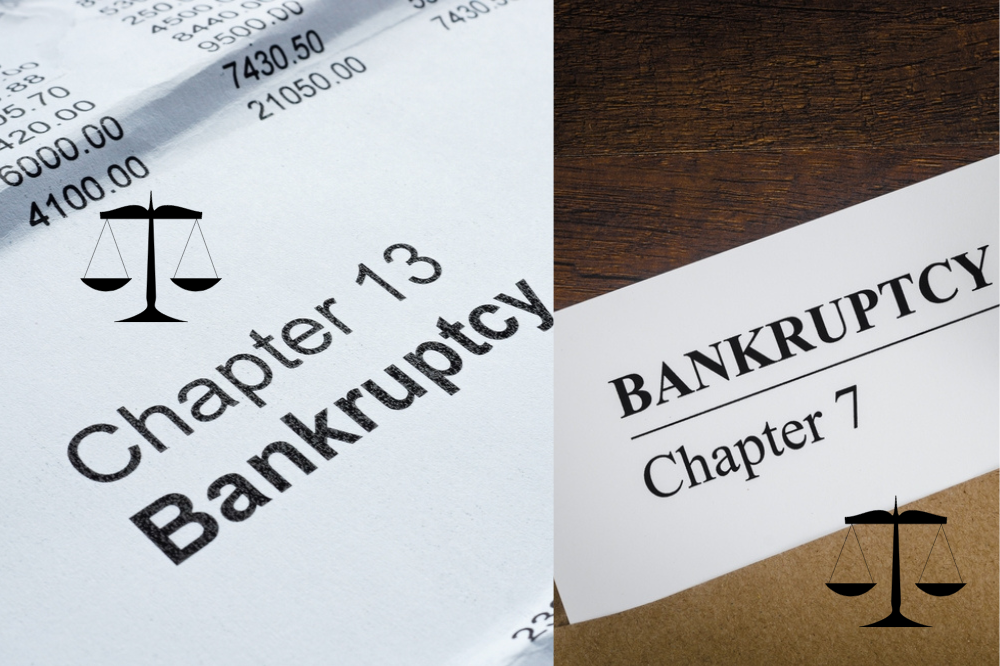By Brian Figeroux, Esq. | Editorial Credit: Smart Calender/ shutterstock.com
Bankruptcy law, in theory, is designed to offer individuals and businesses a fresh start when they are overwhelmed by debt. The process should be equitable, neutral, and available to all debtors, regardless of their race or socioeconomic background. However, a growing body of evidence suggests that racial disparities exist in how bankruptcy is administered, particularly in the legal advice provided to debtors. Read more at www.askthelawyer.us. To read the complete analysis in our publication, click here, and on our civil rights blog, click here.
Introduction
Bankruptcy law, in theory, is designed to offer individuals and businesses a fresh start when they are overwhelmed by debt. The process should be equitable, neutral, and available to all debtors, regardless of their race or socioeconomic background. However, a growing body of evidence suggests that racial disparities exist in how bankruptcy is administered, particularly in the legal advice provided to debtors. A survey has revealed that bankruptcy lawyers are more likely to steer Black debtors into Chapter 13 bankruptcy rather than Chapter 7, even when their financial situations are identical to those of white filers. This disparity is concerning, given that Chapter 13 can be more financially burdensome due to its repayment structure and higher legal fees.
The study also found that lawyers often view Black debtors as having “good values” when they express a preference for Chapter 13. This bias in perception may seem innocuous, but it has profound financial and legal consequences for Black filers. Chapter 13 is not only more expensive but also requires debtors to repay a portion of their debts over several years, making it a less favorable option for those seeking a quicker and more cost-effective resolution to their financial problems.
This analysis will explore whether this disparity in legal advice constitutes malpractice, racial discrimination, or both. It will also delve into the systemic nature of bias in bankruptcy law, examining how and why attorneys provide different advice based on race. Additionally, this analysis will review the responses from major legal publications, bar associations, and bankruptcy judges to these findings. Finally, it will provide a comprehensive overview of the legal recourse available for Black debtors who have been victims of racial bias in bankruptcy proceedings.
Background on Bankruptcy and the Disparities Between Chapter 7 and Chapter 13
Bankruptcy is a legal process that allows individuals or businesses to discharge or reorganize their debts under federal law. The U.S. Bankruptcy Code provides several different chapters under which a debtor can file, with Chapter 7 and Chapter 13 being the most common for individuals. Each chapter offers different paths for dealing with debt, and the choice between them can have significant long-term consequences.
Chapter 7 Bankruptcy
Chapter 7, often referred to as “liquidation” bankruptcy, allows debtors to discharge most unsecured debts quickly and without the need for a repayment plan. In exchange, the debtor’s non-exempt assets may be sold off by a bankruptcy trustee to repay creditors, although many filers have little or no assets to liquidate. Chapter 7 is typically completed within a few months, making it a faster and less expensive option. Legal fees for Chapter 7 filings are also generally lower than those for Chapter 13, as there is no need to create or manage a repayment plan.
Chapter 13 Bankruptcy
Chapter 13, by contrast, is known as “reorganization” bankruptcy. It allows debtors to keep their assets but requires them to repay a portion of their debts over three to five years under a court-approved repayment plan. Chapter 13 is often preferred by individuals with regular income who want to catch up on missed mortgage or car payments, as it provides an opportunity to avoid foreclosure or repossession. However, the process is lengthier and more complex than Chapter 7, resulting in higher legal fees. Additionally, the debtor must stick to the repayment plan for several years, and failure to do so can lead to the case being dismissed or converted to Chapter 7.
The Financial Disparity
For most debtors, Chapter 7 is the more financially advantageous option. It is faster, cheaper, and allows for the immediate discharge of most debts. Chapter 13, while beneficial in some specific situations (such as saving a home from foreclosure), is generally more expensive and burdensome. The higher costs of Chapter 13 come from both the repayment plan and the increased legal fees, which cover the attorney’s ongoing work throughout the multi-year case.
Thus, when bankruptcy lawyers disproportionately recommend Chapter 13 to Black debtors, even when they have identical financial circumstances to white debtors who are recommended Chapter 7, this disparity raises serious questions about the fairness of the legal advice being provided. The survey in question has revealed this troubling trend, and it suggests that Black debtors are being steered into a more costly and less advantageous form of bankruptcy.
III. The Study: Racial Disparities in Legal Advice
The study that uncovered these disparities was comprehensive, involving thousands of bankruptcy filings and interviews with bankruptcy lawyers across the country. It sought to determine whether race played a role in the type of bankruptcy chapter recommended to debtors and, if so, why. The results of the study were both revealing and alarming.
Key Findings of the Study
Disproportionate Steering to Chapter 13: Black debtors were far more likely to be recommended Chapter 13 bankruptcy than their white counterparts, even when their financial situations were identical. In fact, Black filers were twice as likely to be steered toward Chapter 13. This disparity persisted even when controlling for factors such as income, assets, and the type of debt involved.
Perceptions of “Good Values”: The survey also found that lawyers were more likely to view Black debtors as having “good values” if they expressed a preference for Chapter 13. This perception, while seemingly positive on the surface, contributed to the steering of Black debtors toward a more burdensome bankruptcy process. Lawyers tended to interpret a desire to repay debts as a sign of good moral character, which led them to recommend Chapter 13 more frequently to Black clients, even when Chapter 7 would have been a better option financially.
Economic Consequences for Black Debtors: The economic consequences of being steered into Chapter 13 are significant. Black debtors, who are already more likely to be economically disadvantaged, face higher legal fees, longer repayment periods, and a greater risk of having their cases dismissed if they cannot keep up with the repayment plan. This places an additional financial burden on Black families, many of whom are already struggling with systemic economic inequality.
The Role of Implicit Bias
One of the most striking aspects of the study is the role of implicit bias in the legal advice provided to Black debtors. Implicit bias refers to the unconscious attitudes or stereotypes that affect individuals’ understanding, actions, and decisions. In the case of bankruptcy law, implicit bias may lead lawyers to view Black debtors differently than white debtors, even when they have similar financial situations.
For example, lawyers may unconsciously assume that Black debtors are more likely to default on their obligations, leading them to recommend Chapter 13 as a way to ensure that some debts are repaid. Alternatively, they may view Black debtors as more morally upright when they express a desire to repay their debts, which leads them to steer these clients toward Chapter 13. These biases, while subtle, have a profound impact on the legal outcomes for Black debtors.
Survey Methodology and Scope
The survey that uncovered these disparities was conducted over several years and involved thousands of bankruptcy cases from across the United States. It included both quantitative data, such as the type of bankruptcy filed and the financial situation of the debtor, and qualitative data from interviews with bankruptcy lawyers. The researchers controlled for various factors that could influence the choice of bankruptcy chapter, such as income, assets, and debt type, to isolate the impact of race on the legal advice provided.
The results of the survey are a stark reminder that racial bias, both implicit and explicit, continues to influence the legal system. While bankruptcy law should be a neutral and equitable process, the reality is that Black debtors are being disproportionately steered into a more costly and less favorable form of bankruptcy.
Legal Analysis: Is This Malpractice or Racial Discrimination?
The findings of the study raise serious questions about the legality and ethics of the advice provided by bankruptcy lawyers. Is steering Black debtors into Chapter 13, when Chapter 7 would be a better option, a form of legal malpractice or racial discrimination? To answer this question, it is necessary to examine the legal standards for malpractice and discrimination in the context of bankruptcy law.
Legal Malpractice
Legal malpractice occurs when an attorney fails to provide competent representation, resulting in harm to the client. In the context of bankruptcy law, this could include giving advice that is not in the client’s best financial interest. To establish a claim for legal malpractice, a plaintiff must generally prove the following elements:
Duty of Care: The attorney owed a duty to provide competent legal advice.
Breach of Duty: The attorney breached that duty by providing advice that was not in the client’s best interest.
Causation: The breach of duty caused harm to the client.
Damages: The client suffered financial harm as a result of the attorney’s breach.
In the case of Black debtors being steered into Chapter 13, there is a strong argument that the attorneys breached their duty of care by recommending a more expensive and burdensome form of bankruptcy when Chapter 7 would have been a better option. This breach could have caused financial harm to the debtor, in the form of higher legal fees, longer repayment periods, and a greater risk of case dismissal.
Racial Discrimination
Racial discrimination in the provision of legal services is prohibited by both federal and state laws. The Civil Rights Act of 1964, for example, prohibits discrimination on the basis of race in public accommodations, which includes the provision of legal services. In addition, many states have their own anti-discrimination laws that apply to attorneys.
To establish a claim of racial discrimination, a plaintiff would need to show that the attorney’s advice was influenced by the client’s race, and that this advice resulted in a less favorable outcome for the client. The survey results provide strong evidence that Black debtors are being steered into Chapter 13 at a higher rate than white debtors, even when they have identical financial situations. This disparity suggests that race is influencing the legal advice provided, which could form the basis for a claim of racial discrimination.
Ethical Considerations
In addition to legal malpractice and discrimination claims, the behavior of the attorneys in these cases raises serious ethical concerns. Attorneys are bound by ethical rules that require them to provide competent and impartial legal advice. The American Bar Association’s Model Rules of Professional Conduct, for example, require attorneys to act in the best interests of their clients and to avoid conduct that reflects adversely on their fitness to practice law.
Steering Black debtors into a more costly and burdensome form of bankruptcy, based on their race, would likely violate these ethical rules. Attorneys found to have engaged in such conduct could face disciplinary action, including suspension or disbarment.
Institutional Responses: Publications, Bar Associations, and Judges on the Issue
The troubling racial disparities uncovered by the study have not gone unnoticed by major legal publications, bar associations, and bankruptcy judges. This section explores how these institutions have responded to the issue of Black debtors being disproportionately steered into Chapter 13 bankruptcy and what measures have been proposed or implemented to address this bias.
Major Publications on Racial Bias in Bankruptcy
Several major legal and financial publications have examined the issue of racial bias in bankruptcy filings, especially in light of the study’s findings. These publications have brought attention to the systemic disparities in bankruptcy outcomes for Black debtors.
The New York Times and The Washington Post have both run articles addressing the racial disparities in bankruptcy law. These pieces highlighted the findings of the study and interviewed bankruptcy experts who expressed concern over the economic and legal implications of steering Black debtors into Chapter 13. Both publications called for reforms to ensure that the bankruptcy process is fair and equitable for all filers, regardless of race.
NPR featured a segment on racial bias in bankruptcy law, where they interviewed both bankruptcy attorneys and debtors. The segment emphasized the financial toll that Chapter 13 places on Black families, many of whom are already dealing with systemic economic challenges. NPR’s reporting focused on the need for increased awareness among bankruptcy attorneys of their potential implicit biases and called for more robust oversight of legal advice provided in bankruptcy cases.
The American Bankruptcy Institute Journal, a leading publication for bankruptcy professionals, dedicated an issue to exploring the broader context of racial disparities in bankruptcy filings. The journal discussed the implications of the study’s findings and urged bankruptcy attorneys to undergo training in implicit bias to ensure that they are providing neutral and fair legal advice. It also called for greater data collection on bankruptcy filings to identify and address disparities.
ProPublica, a nonprofit investigative journalism outlet, has conducted several investigations into racial disparities in bankruptcy law. Their reporting has been particularly influential in highlighting how Black debtors face unique challenges in the bankruptcy system. ProPublica found that Black filers in Southern states were especially likely to be steered into Chapter 13, a trend that echoes the findings of the broader study.
Responses from Bar Associations
Bar associations, both at the national and state level, have also weighed in on the issue of racial bias in bankruptcy. These organizations play a critical role in regulating the conduct of attorneys and ensuring that legal ethics are upheld.
The American Bar Association (ABA) has publicly acknowledged the study’s findings and has committed to addressing racial disparities in legal practice, including bankruptcy law. The ABA’s Commission on Racial and Ethnic Diversity in the Profession released a statement urging bankruptcy attorneys to be aware of their potential biases and to provide legal advice based solely on the debtor’s financial circumstances, not their race. The ABA also recommended that bankruptcy attorneys undergo regular training on implicit bias and cultural competency.
Several state bar associations, including those in states with high rates of Chapter 13 filings among Black debtors, have issued guidance to their members regarding racial bias in bankruptcy law. For example, the State Bar of Georgia has conducted seminars on the ethical responsibilities of bankruptcy attorneys and has emphasized the importance of fair and impartial legal advice. The California State Bar has gone a step further by incorporating implicit bias training into its continuing legal education requirements for all attorneys, including those practicing bankruptcy law.
The National Association of Consumer Bankruptcy Attorneys (NACBA), which represents the interests of consumer bankruptcy attorneys, has been vocal about the need for reforms in the bankruptcy system. NACBA has called for increased scrutiny of Chapter 13 filings to ensure that they are not being disproportionately recommended to Black debtors. The association has also advocated for greater transparency in attorney-client interactions to prevent racial bias from influencing the advice provided to debtors.
Bankruptcy Judges and Court Rulings on Racial Bias
While the study’s findings have sparked conversations in the legal community, the issue of racial bias in bankruptcy has also reached the courts. Several bankruptcy judges have commented on the disparities in Chapter 7 and Chapter 13 filings, and some have taken steps to address these issues within their own courtrooms.
Bankruptcy Judges’ Comments on Racial Disparities:
Judge C. Ray Mullins of the U.S. Bankruptcy Court for the Northern District of Georgia has been an outspoken advocate for addressing racial disparities in bankruptcy filings. Judge Mullins has acknowledged the study’s findings and called for greater awareness among bankruptcy judges and attorneys of the potential for implicit bias. He has emphasized that the bankruptcy system must be a “fresh start” for all individuals, regardless of race, and that disparities in Chapter 13 filings undermine the fairness of the process.
Judge Jeff Bohm of the Southern District of Texas has similarly addressed the issue of racial bias in bankruptcy court. During a conference of bankruptcy professionals, Judge Bohm discussed the need for reforms to ensure that legal advice is based on financial realities, not racial assumptions. He also suggested that bankruptcy judges could play a role in scrutinizing Chapter 13 filings to ensure that debtors are not being unnecessarily steered into this more burdensome option.
Court Rulings on Racial Bias:
While there have not been many rulings directly addressing racial bias in bankruptcy filings, some courts have indirectly touched on the issue through decisions related to attorney misconduct and legal malpractice. For example, in the case of In re Smith, a debtor alleged that his attorney steered him into Chapter 13 based on racially biased assumptions about his financial situation. The court ruled that the debtor had a valid claim for legal malpractice and allowed the case to proceed, setting a potential precedent for future cases involving racial bias in bankruptcy.
Additionally, courts have increasingly been open to hearing cases involving implicit bias, even in the absence of overt racial discrimination. This trend suggests that bankruptcy judges may be more willing to address racial disparities in the future, particularly if debtors bring claims of biased legal advice.
Broader Context: Systemic Racism in Legal and Financial Systems
The racial disparities in bankruptcy filings cannot be fully understood without considering the broader context of systemic racism in both the legal and financial systems. Black Americans have long faced discriminatory practices in access to credit, homeownership, and legal representation, and these inequities are reflected in the bankruptcy process as well.
Historical and Structural Roots of Racial Disparities in Bankruptcy
The roots of racial disparities in bankruptcy law can be traced back to broader patterns of economic and legal discrimination against Black Americans. Historically, Black families have been denied access to the same financial resources as their white counterparts, from housing discrimination in the form of redlining to predatory lending practices that disproportionately target communities of color.
These systemic barriers have contributed to the wealth gap between Black and white Americans, with Black families generally having fewer assets and higher levels of debt. This economic inequality means that Black debtors are more likely to turn to bankruptcy as a solution to their financial problems. However, even within the bankruptcy system, they face additional barriers, such as being steered into Chapter 13, which further exacerbates their financial challenges.
Implicit Bias in the Legal Profession
The legal profession, like many other sectors, is not immune to implicit bias. Implicit bias refers to the unconscious attitudes or stereotypes that influence decision-making, often without the individual being aware of it. In the context of bankruptcy law, implicit bias may lead attorneys to make different recommendations based on the debtor’s race, even if they are unaware that their advice is being influenced by racial assumptions.
For example, an attorney may unconsciously assume that a Black debtor is more likely to default on their obligations and therefore recommend Chapter 13 as a way to ensure that some debts are repaid. Alternatively, the attorney may view Black debtors as more morally upright if they express a preference for repaying their debts, leading to a recommendation for Chapter 13 even when Chapter 7 would be a better option financially.
These biases, while subtle, have a significant impact on the legal outcomes for Black debtors. By steering them into a more costly and burdensome form of bankruptcy, attorneys are perpetuating the cycle of economic inequality that Black families face.
Racial Disparities in Access to Legal Resources
Another factor contributing to the racial disparities in bankruptcy filings is the unequal access to legal resources. Black debtors are less likely to have access to high-quality legal representation, often relying on overburdened or less experienced attorneys. This lack of access to competent legal advice can result in poor outcomes, such as being steered into Chapter 13 when Chapter 7 would be more appropriate.
Moreover, Black debtors may be less likely to challenge their attorney’s advice, either because they trust their attorney’s judgment or because they lack the resources to seek a second opinion. This power imbalance between debtor and attorney further contributes to the racial disparities in bankruptcy outcomes.
VII. Legal Recourse for Victims of Racial Bias in Bankruptcy
For Black debtors who have been victims of racial bias in bankruptcy filings, there are several legal recourses available. These options include civil lawsuits for malpractice or racial discrimination, filing complaints with bar associations, and pursuing remedies through the bankruptcy court system.
Civil Lawsuits for Malpractice or Racial Discrimination
One of the most direct forms of legal recourse is to file a civil lawsuit against the attorney for legal malpractice or racial discrimination. To succeed in a malpractice claim, the debtor must prove that the attorney breached their duty of care by providing incompetent legal advice, and that this breach caused financial harm. In cases involving racial bias, the debtor could argue that the attorney’s advice was influenced by implicit or explicit racial bias, leading to a less favorable outcome.
In addition to malpractice claims, Black debtors may also have a claim for racial discrimination under federal or state anti-discrimination laws. For example, the Civil Rights Act of 1964 prohibits discrimination on the basis of race in public accommodations, including the provision of legal services. If a debtor can prove that their attorney’s advice was influenced by racial bias, they may be entitled to damages, including compensation for the financial harm caused by the biased advice.
Filing Complaints with Bar Associations
Black debtors who believe they have been the victims of racial bias in bankruptcy can also file complaints with their state bar association. Bar associations are responsible for regulating the conduct of attorneys and have the authority to discipline attorneys who violate ethical rules. If a bar association finds that an attorney has engaged in racial bias or provided incompetent legal advice, the attorney could face disciplinary action, including suspension or disbarment.
Filing a complaint with a bar association can be an effective way to hold an attorney accountable for their actions and to prevent them from providing biased advice to other clients in the future.
Pursuing Remedies Through the Bankruptcy Court System
In some cases, Black debtors may be able to seek remedies directly through the bankruptcy court system. For example, if a debtor believes that their attorney steered them into Chapter 13 based on racial bias, they could file a motion to reconsider or reopen their bankruptcy case. This would allow the court to review the debtor’s financial situation and determine whether Chapter 7 would have been a more appropriate option.
Additionally, debtors could challenge their attorney’s fees if they believe they were charged higher fees as a result of being steered into Chapter 13. Bankruptcy courts have the authority to review and adjust attorney fees, and a debtor could argue that they should not be required to pay higher fees if they were steered into Chapter 13 based on racial bias.
Federal and State-Level Protections
In addition to the specific remedies available through civil lawsuits and the bankruptcy court system, Black debtors are also protected by a range of federal and state anti-discrimination laws. These laws provide additional avenues for legal recourse if a debtor believes they have been the victim of racial bias in bankruptcy filings.
At the federal level, the Civil Rights Act of 1964 prohibits discrimination on the basis of race in the provision of legal services. In addition, the Fair Housing Act and other federal laws protect against racial discrimination in financial transactions, including bankruptcy filings.
At the state level, many states have their own anti-discrimination laws that provide additional protections for Black debtors. These laws vary by state, but they generally prohibit racial discrimination in the provision of legal services and financial transactions.
VIII. Conclusion
The findings of the study on racial bias in bankruptcy filings reveal a troubling disparity in how Black debtors are treated within the bankruptcy system. Black debtors are disproportionately steered into Chapter 13 bankruptcy, a more costly and burdensome option, even when they have financial situations identical to those of white debtors. This disparity raises serious questions about the legality and ethics of the advice provided by bankruptcy attorneys.
While some of the bias may be the result of implicit attitudes, the consequences for Black debtors are severe. They face higher legal fees, longer repayment periods, and a greater risk of having their cases dismissed if they cannot adhere to the repayment plan. This steering, whether intentional or not, perpetuates the cycle of economic inequality that Black families already face.
Legal malpractice, racial discrimination, and ethical violations are all potential avenues for Black debtors to seek redress. They may pursue civil lawsuits, file complaints with bar associations, or challenge their bankruptcy cases in court. Furthermore, institutional changes are needed to address the systemic nature of racial bias in bankruptcy, from mandatory implicit bias training for bankruptcy attorneys to increased oversight of Chapter 13 filings.
As the legal community continues to grapple with the issue of racial bias in bankruptcy filings, it is clear that more must be done to ensure that the bankruptcy system offers a true “fresh start” for all debtors, regardless of race.
Click Here to Schedule a Consultation with Figeroux & Associates Today!




